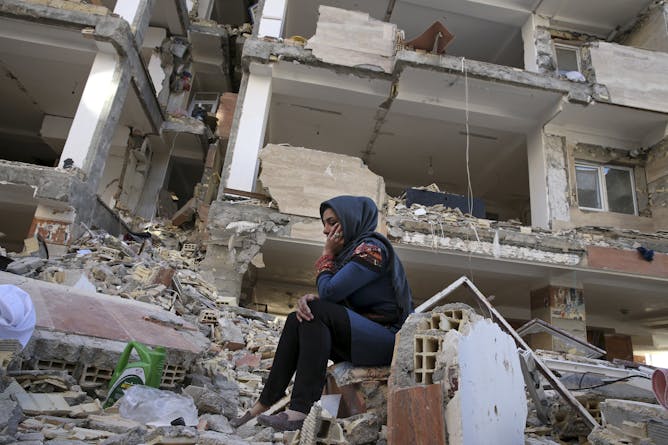|
On November 12, a 7.3-magnitude quake killed some 500 people and injured 7,000 along the Iran-Iraq border. This Kurdish area has also been crushed by war and was attacked after a recent separatist vote. In the absence of effective government aid, individuals and non-profit organisations are stepping in to help Iranian earthquake victims.
Meanwhile, in Indonesia, regressive policies and political developments have been referred to as an “illiberal turn” by some commentators. But as Evan Laksmana writes, Indonesia’s democratic woes are many, and each needs to be viewed in isolation.
|

Many of the Iranian dead in the Nov. 12 Iran earthquake lived in the Mehr Housing, state-built affordable apartments that crumbled when other buildings stayed up.
AP Photo/Vahid Salemi
Haidar Khezri, Indiana University
On Nov. 12, a 7.3 magnitude quake killed some 500 and injured 7,000 along the Iran-Iraq border. This Kurdish area has also been crushed by war and, after a recent separatist vote, militarily attacked.
|
Arts + Culture
|
-
James Rodgers, City, University of London
The BBC's former correspondent in Gaza reviews Donald Macintyre's Gaza: Preparing for Dawn.
|
|
Environment + Energy
|
-
David Beirman, University of Technology Sydney
Until late November, Bali's high economic dependence on tourism led its Tourism Board to dismiss the dangers of the Mount Agung volcano. This severely undermined the reputation of destination Bali..
-
Ursula Ellenberg, La Trobe University
Penguins in New Zealand, Australia and elsewhere face an uncertain future as a new review documents the number accidentally ensnared in fishing nets.
|
|
Politics + Society
|
-
Evan A. Laksmana, Centre for Strategic and International Studies, Indonesia
Haphazardly using unspecified terms like "illiberal turn" does little to help us properly diagnose Indonesia's democratic challenges.
-
Jennifer Mercieca, Texas A&M University
An expert in American political rhetoric explains why Trump's controversial retweets are actually an extremely effective rhetorical device.
-
Dina Afrianty, Australian Catholic University; Karen Soldatic, Western Sydney University
An Indonesia-Australia collaboration is working to improve inclusion for disabled people in Indonesian schools, including in Islamic institutions.
|
|
Science + Technology
|
-
Richard John Arculus, Australian National University
'Volcano forensics' involves a mixture of modern day monitoring and analysis of past eruptions. Geologists use volcanic rocks as a kind of time capsule to assess what happened previously.
|
|